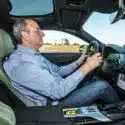Andrew Frankel: Aston Martin DB12 is the first car of the Lawrence Stroll era
‘It’s reasonable for expectations to be high. But the existence of another future product now seems in doubt’
Since we last met I have driven the new Aston Martin DB12 in the south of France but because it’s such an important car to the company, it will take six weeks to get the world’s mainstream, automotive and lifestyle press (plus, doubtless, a smattering of the influencers you get these days who’ll say whatever you damn well like about a new car so long as you pay them enough) through its elegant doors. Which means I can’t write about it until the last has been in it – allowing us all to publish at the same time – so it’ll be next month before my review is published.
But while there I had a chat with Lawrence Stroll. He’s about as easy an interview as a hack could wish to have, insofar as I reckon he was 10 minutes in before I even had to open my mouth. Actually, this approach can be immensely frustrating as media-trained CEOs spout fluffy company lines aiming to smother any more interesting avenues of enquiry you might have. Not Stroll. It is fair to say he is not blind to his achievements at Aston and elsewhere, but what he talks about is not only interesting, but useful. He can even do self-deprecation of a certain kind – “if you want to become a multi-millionaire try starting as a multi-billionaire and buy a Formula 1 team…”
So far as the F1 team is concerned, he came with a seven-year plan at the end of which it would be worthy of winning world championships. Three years in, his aim for this season was to finish fourth in the constructors’, matching the performance of the team in its final year as Racing Point in 2020. In fact, after Monaco it was P2, a single point ahead of Mercedes-AMG. If it can end up in that position – which will require his son Lance to stay close to Fernando Alonso all season – the team will be two years ahead of Stroll’s schedule.
By his estimation he needed three things to get the team where he wanted: the right staff both in and out of the car which he reckons he now has, a new factory (with accompanying wind tunnel) which the team will be moving into around the time you read this, and an exclusive works engine deal, secured from Honda from the start of the 2026 season. It would be a braver man than I who’d bet he’s not going to get there.
On the road car side Stroll calls the DB12 the first car whose development happened essentially on his watch, though the rapturously received DBX707 was finished after he arrived. So it is reasonable for expectations to be high. But the existence of another future product now seems in doubt.
“Vauxhall’s James Taylor wants to push the carmaker upmarket”
Two CEOs ago, Andy Palmer confirmed that after the extant Valkyrie and forthcoming Valhalla limited edition hypercars, there would be a production supercar to rival the likes of the Ferrari 296 GTB and McLaren 750S. Indeed to Palmer the entire point of not only the Valkyrie and Valhalla but putting the Aston Martin name on Formula 1 cars was to establish Aston’s credentials in the mid-engined arena prior to the introduction of the more mainstream model, which has been entirely unrepresented to date unless you include the Bulldog concept car of some 40 or more years standing. But when I asked Stroll about it he stated that this once confirmed car was now “unconfirmed” which, rightly or wrongly, I took as a euphemism for ‘dead in the water’.
It fits with other comments made by Aston management about the growth in the high-performance luxury sector being among SUV and front-engine cars and the known fact that the DBS name is being retired from the flagship production car to be replaced by a name beginning with a ‘V’. My take? The mid-engined production car was to have been called Vanquish and if that car is now not happening I’d bet plenty the name will go on the DBS replacement instead.
I read that Vauxhall has no plans to follow the likes of Volkswagen, Renault, Skoda and Citroën in offering an EV for less than £25,000. On the contrary the price of its cheapest electric vehicle, the Corsa Electric, currently stands at almost £32,000 and is shortly to rise further. The reason, according to top man James Taylor, is that he wants to push Vauxhall upmarket where it can become an “upper-mainstream brand”.
And I’d quite like to shed 10 years, 20kg and have the physique of Ryan Reynolds, but I don’t think it’s going to happen. I understand both the margin-driven desire and the need for Vauxhall to find a place of its own within the vast Stellantis empire – but repositioning a brand in the marketplace when for as long as I’ve been a motoring writer a Vauxhall is what you buy when you don’t want a Volkswagen is a process that will take years, possibly decades. Moreover, to do it will require not just enormous investment but a product offensive of a kind and quality I’ve not known from Vauxhall in 35 years doing this job.
And what about all those young buyers who will hopefully purchase the next generation of more affordable EVs? None of them will now be in Vauxhalls: they’ll be Vauxhall’s chief marketplace rivals and unless it can somehow summon up some utterly compelling reason for them to switch brands en masse, there I fear they are likely to stay.
A former editor of Motor Sport, Andrew splits his time between testing the latest road cars and racing (mostly) historic machinery
Follow Andrew on Twitter @Andrew_Frankel

